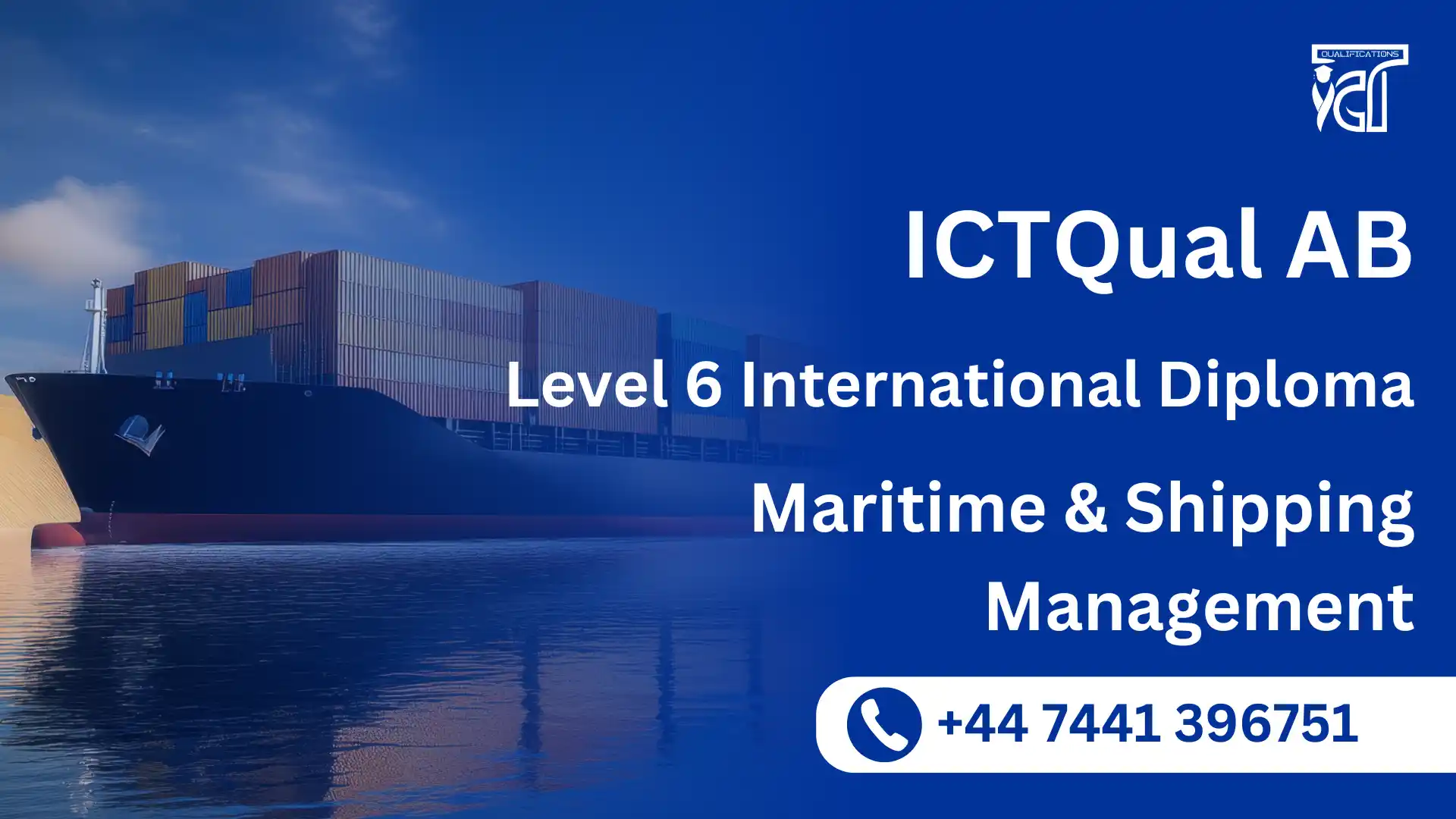The ICTQual AB Level 6 International Diploma in Maritime & Shipping Management is a comprehensive programme designed for learners who aspire to excel in the dynamic global maritime industry. Whether you are a fresher eager to build a career in shipping and logistics or a professional seeking to advance into management roles, this diploma equips learners with the knowledge, strategic skills, and practical expertise necessary to thrive in maritime and shipping operations.
Spanning three years with a 360-credit structure, the programme provides an in-depth understanding of shipping management, maritime logistics, port operations, international trade regulations, and fleet management. Learners gain insights into operational efficiency, risk management, and compliance, enabling them to make informed decisions in the fast-paced maritime sector.
Graduates emerge with a strong professional edge, ready to pursue careers in shipping companies, logistics firms, port authorities, freight forwarding agencies, and maritime consultancy services. The course emphasises leadership, operational planning, and strategic decision-making, ensuring learners can manage complex maritime operations and contribute effectively to global trade networks.
Key benefits of completing this diploma include enhanced career prospects, specialised expertise, and the ability to lead operational and management functions within the maritime industry. Learners develop critical analytical skills, project management capabilities, and knowledge of international maritime standards, positioning themselves as competent and adaptable professionals.
By combining theoretical foundations with practical applications, the ICTQual AB Level 6 International Diploma in Maritime & Shipping Management provides learners with a holistic, career-oriented education, supporting long-term professional growth and international recognition in the maritime and shipping sector.
ICTQual AB Level 6 International Diploma in Maritime & Shipping Management
This qualification, the ICTQual AB Level 6 International Diploma in Maritime & Shipping Management, consists of 36 mandatory units.
Year 1 – Foundations of Maritime & Shipping Management
- Introduction to Maritime & Shipping Industry
- Principles of Shipping Operations
- International Trade and Logistics Fundamentals
- Maritime Law and Regulatory Frameworks
- Port Operations and Management Basics
- Ship Types, Classification, and Vessel Management
- Maritime Safety and Security Principles
- Environmental Sustainability in Shipping
- Supply Chain and Transport Management
- Principles of Risk Management in Maritime Operations
- Introduction to Maritime Economics
- Professional Ethics and Communication in Shipping
Year 2 – Applied Maritime Operations & Management
- Advanced Shipping Operations and Planning
- Vessel Chartering and Freight Management
- Maritime Logistics and Supply Chain Integration
- Port Management and Terminal Operations
- Maritime Insurance and Risk Mitigation
- Crisis Management and Emergency Response in Shipping
- Shipping Finance and Budgeting
- Environmental Compliance and Marine Pollution Control
- Technology and Digitalisation in Maritime Industry
- Project Management in Maritime Operations
- Human Resource Management in Shipping Organisations
- Applied Case Studies and Operational Simulations
Year 3 – Strategic Leadership & Advanced Maritime Management
- Strategic Management in Maritime & Shipping Industry
- International Maritime Policies and Governance
- Maritime Trade Law and Contract Management
- Leadership and Decision-Making in Shipping Operations
- Advanced Risk and Safety Management in Maritime Sector
- Port and Terminal Strategic Planning
- Global Supply Chain Management for Maritime Trade
- Innovation and Emerging Technologies in Shipping
- Sustainability and Climate Change Adaptation in Shipping
- Research Methods for Maritime Management
- Independent Research Project in Maritime & Shipping Management
- Capstone Project: Applied Maritime & Shipping Strategy
Learning Outcomes for the ICTQual AB Level 6 International Diploma in Maritime & Shipping Management 360 Credits – Three Years:
Year 1 – Foundations of Maritime & Shipping Management
1. Introduction to Maritime & Shipping Industry
- Explain the structure, functions, and scope of the global maritime and shipping industry.
- Identify key stakeholders and their roles in shipping operations.
2. Principles of Shipping Operations
- Describe core shipping operations including vessel management, cargo handling, and voyage planning.
- Apply operational procedures to ensure safe and efficient shipping activities.
3. International Trade and Logistics Fundamentals
- Analyse principles of international trade and global logistics networks.
- Apply basic logistics strategies to shipping operations.
4. Maritime Law and Regulatory Frameworks
- Explain key national and international maritime laws and conventions.
- Ensure compliance with legal and regulatory requirements in shipping operations.
5. Port Operations and Management Basics
- Describe the functions and operational processes of ports and terminals.
- Apply basic management techniques for efficient port operations.
6. Ship Types, Classification, and Vessel Management
- Identify different types of ships and their classifications.
- Understand vessel management practices, including maintenance, safety, and operational planning.
7. Maritime Safety and Security Principles
- Recognise safety and security risks in maritime operations.
- Apply standard safety protocols and security measures onboard vessels and within ports.
8. Environmental Sustainability in Shipping
- Analyse environmental impacts of shipping activities.
- Propose strategies to minimise pollution and promote sustainability.
9. Supply Chain and Transport Management
- Understand basic supply chain processes in maritime logistics.
- Apply transport management principles to optimise shipping operations.
10. Principles of Risk Management in Maritime Operations
- Identify operational and strategic risks in shipping.
- Apply basic risk assessment and mitigation strategies.
11. Introduction to Maritime Economics
- Analyse economic factors affecting global shipping and trade.
- Apply economic concepts to decision-making in maritime operations.
12. Professional Ethics and Communication in Shipping
- Apply ethical principles in maritime management and operations.
- Develop effective communication strategies within shipping organisations.
Year 2 – Applied Maritime Operations & Management
1. Advanced Shipping Operations and Planning
- Develop comprehensive shipping operational plans.
- Implement efficient vessel scheduling and cargo handling procedures.
2. Vessel Chartering and Freight Management
- Understand chartering contracts and freight arrangements.
- Apply principles of freight management and commercial operations.
3. Maritime Logistics and Supply Chain Integration
- Integrate supply chain components into maritime operations.
- Optimise logistics processes for efficiency and cost-effectiveness.
4. Port Management and Terminal Operations
- Apply advanced management techniques to port and terminal operations.
- Ensure safety, efficiency, and regulatory compliance in terminal operations.
5. Maritime Insurance and Risk Mitigation
- Analyse maritime insurance policies and risk coverage.
- Apply risk mitigation strategies to reduce operational and financial exposure.
6. Crisis Management and Emergency Response in Shipping
- Develop emergency response plans for shipping operations.
- Coordinate crisis management procedures during maritime incidents.
7. Shipping Finance and Budgeting
- Prepare and manage financial plans for maritime operations.
- Analyse cost structures, revenue streams, and budgeting techniques.
8. Environmental Compliance and Marine Pollution Control
- Ensure compliance with environmental regulations.
- Implement pollution prevention measures and environmental management strategies.
9. Technology and Digitalisation in Maritime Industry
- Evaluate emerging technologies in shipping and maritime operations.
- Apply digital tools to enhance operational efficiency and monitoring.
10. Project Management in Maritime Operations
- Plan and execute maritime projects effectively.
- Monitor progress and ensure alignment with operational objectives.
11. Human Resource Management in Shipping Organisations
- Apply HR management principles within maritime organisations.
- Develop strategies for team leadership, performance management, and workforce development.
12. Applied Case Studies and Operational Simulations
- Analyse real-world maritime case studies to solve operational challenges.
- Apply theoretical knowledge in simulated operational environments.
Year 3 – Strategic Leadership & Advanced Maritime Management
1. Strategic Management in Maritime & Shipping Industry
- Develop and implement strategic plans for shipping organisations.
- Analyse market trends and competitive factors in global shipping.
2. International Maritime Policies and Governance
- Evaluate international policies and governance frameworks.
- Apply regulatory requirements to organisational strategies.
3. Maritime Trade Law and Contract Management
- Interpret trade laws, shipping contracts, and agreements.
- Ensure compliance with contractual obligations and dispute resolution practices.
4. Leadership and Decision-Making in Shipping Operations
- Apply leadership theories to operational and strategic decision-making.
- Lead teams effectively during complex maritime operations.
5. Advanced Risk and Safety Management in Maritime Sector
- Develop comprehensive risk management and safety strategies.
- Implement proactive measures to mitigate operational and environmental risks.
6. Port and Terminal Strategic Planning
- Plan long-term strategies for efficient and sustainable port operations.
- Optimise terminal layouts, resource allocation, and operational workflows.
7. Global Supply Chain Management for Maritime Trade
- Manage integrated supply chains across international shipping networks.
- Analyse logistics performance and propose improvements for global operations.
8. Innovation and Emerging Technologies in Shipping
- Evaluate the impact of emerging technologies and innovations.
- Apply innovative solutions to improve operational efficiency and competitiveness.
9. Sustainability and Climate Change Adaptation in Shipping
- Analyse climate change impacts on shipping operations.
- Develop strategies to enhance sustainability and resilience in maritime activities.
10. Research Methods for Maritime Management
- Apply research methodologies to maritime and shipping studies.
- Collect, analyse, and interpret data to support evidence-based decision-making.
11. Independent Research Project in Maritime & Shipping Management
- Conduct an independent research project aligned with industry challenges.
- Present findings with practical recommendations for maritime operations.
12. Capstone Project: Applied Maritime & Shipping Strategy
- Integrate knowledge and skills from all study units into a comprehensive applied project.
- Demonstrate strategic planning, operational execution, and leadership in maritime scenarios.
Completing the ICTQual AB Level 6 International Diploma in Maritime & Shipping Management equips learners with the expertise, practical skills, and professional credibility needed to excel in the global maritime industry. The programme prepares learners to manage shipping operations, logistics, and maritime businesses efficiently while fostering leadership and strategic decision-making skills.
1. Advanced Knowledge in Maritime & Shipping Management
- In-depth understanding of maritime logistics, port operations, and fleet management.
- Knowledge of international shipping regulations and trade compliance.
- Insight into maritime economics, shipping finance, and risk management.
- Awareness of global supply chain operations and operational efficiency.
- Ability to analyse industry trends and apply strategic decision-making.
2. Career Advancement Opportunities
- Enhanced employability in shipping companies, port authorities, and logistics firms.
- Eligibility for managerial roles in shipping operations and maritime consultancy.
- Opportunities in international trade, freight forwarding, and port management.
- Positions in shipping finance, risk assessment, and operational coordination.
- Strong foundation for leadership roles within maritime and logistics organisations.
3. Practical Skills Development
- Competence in operational planning, fleet management, and logistics coordination.
- Training in risk assessment, compliance, and maritime project management.
- Development of problem-solving, decision-making, and analytical skills.
- Hands-on experience with shipping documentation, contracts, and international trade procedures.
- Ability to implement effective strategies for efficiency and safety in maritime operations.
4. Professional Recognition and Credibility
- Demonstrates commitment to professional excellence in maritime and shipping management.
- Strengthens credibility for roles in corporate, governmental, and international organisations.
- Provides learners with an internationally recognised, verifiable qualification.
- Prepares learners for leadership and advisory positions within the industry.
- Enhances professional reputation in global maritime networks.
5. Long-term Personal and Industry Impact
- Empowers learners to influence operational and strategic decisions in maritime businesses.
- Encourages adoption of sustainable practices within shipping and logistics operations.
- Builds confidence in leading teams and managing complex maritime projects.
- Supports the growth of safe, efficient, and sustainable maritime operations.
- Enables learners to make meaningful contributions to global trade and logistics.
This programme is ideal for learners passionate about maritime operations, shipping management, and global trade. It suits both newcomers and experienced professionals seeking advanced skills and international recognition.
1. Aspiring Maritime Professionals
- Fresh learners aiming to start a career in shipping, port management, or logistics.
- Individuals interested in international trade, supply chain, and maritime operations.
- Learners seeking structured education in maritime business and operational management.
- Those motivated to contribute to efficient and safe maritime operations.
- Enthusiastic learners eager to combine theory with practical applications.
2. Experienced Professionals Seeking Career Growth
- Professionals in shipping, logistics, or port management looking to specialise.
- Individuals aspiring to leadership or strategic roles within maritime organisations.
- Managers seeking advanced knowledge in fleet management, shipping finance, and compliance.
- Consultants aiming to provide expertise in maritime operations and trade management.
- Professionals looking to enhance their international credibility and career opportunities.
3. Learners Interested in Policy and Governance
- Individuals keen to understand maritime regulations, compliance, and operational governance.
- Those who wish to influence strategic decisions in shipping and port management.
- Learners aiming to lead projects in global trade, logistics, and shipping operations.
- Professionals interested in ethical and responsible maritime management practices.
- Learners motivated to develop sustainable operational strategies in the maritime sector.
4. Analytical and Strategic Thinkers
- Learners who enjoy analysing data, interpreting trends, and applying strategic solutions.
- Individuals comfortable using digital tools for maritime operations and planning.
- Critical thinkers capable of handling complex logistical and operational challenges.
- Those interested in research and problem-solving for global shipping issues.
- Learners who value precision, operational efficiency, and evidence-based decision-making.
5. Globally Minded and Industry-Focused Learners
- Individuals committed to international trade, global shipping networks, and sustainable logistics.
- Learners seeking career opportunities with multinational shipping or port organisations.
- Those motivated to contribute to the efficiency and safety of global maritime operations.
- Professionals interested in cross-cultural collaboration and international shipping standards.
- Learners who aim to combine leadership with practical industry expertise.
Graduates of this diploma gain access to diverse career paths and leadership opportunities within maritime and shipping management.
1. Career Advancement in Maritime & Shipping
- Managerial positions in shipping companies, ports, and logistics firms.
- Roles in maritime consultancy, freight forwarding, and supply chain management.
- Strategic positions in fleet management, shipping finance, and operational coordination.
- Leadership roles in corporate shipping departments and port authorities.
- Opportunities to influence policies and operational practices in global trade.
2. Specialised Professional Opportunities
- Shipping operations manager, maritime consultant, port operations coordinator, or logistics analyst.
- Engagement in international trade projects, shipping audits, and operational optimisation.
- Participation in global shipping and maritime sustainability initiatives.
- Roles in risk management, compliance, and shipping strategy development.
- Opportunities in research, policy advisory, and operational project management.
3. Leadership and Strategic Roles
- Lead teams in shipping operations and port management projects.
- Oversee strategic planning for maritime logistics and trade initiatives.
- Influence organisational decision-making and operational strategies.
- Manage large-scale shipping projects, fleet operations, and supply chain networks.
- Become a recognised professional within international maritime networks.
4. Academic and Professional Development
- Further studies in maritime management, international trade, or logistics.
- Professional certifications in shipping, port management, and logistics.
- Participation in international conferences, workshops, and maritime research.
- Opportunities for teaching or consulting in maritime management programmes.
- Enhance employability and career mobility globally.
5. Global and Industry Impact
- Contribute to safer, more efficient, and sustainable maritime operations.
- Lead initiatives that improve global trade, port efficiency, and logistics.
- Engage with international teams on operational challenges and innovations.
- Launch consultancy services or ventures in maritime management.
- Make meaningful contributions to the maritime and shipping industry worldwide.
As an approved ICTQual AB centre, we provide two certification routes tailored to learners’ experience:
Route 1: Experienced Professionals
- For learners with at least six years of verifiable experience in maritime, shipping, logistics, or related fields.
- Focuses on advanced modules, practical projects, and strategic learning.
- Ideal for those aiming for leadership or specialist roles.
Route 2: Fresh Learners
- For learners new to maritime and shipping studies.
- Requires completion of 36 structured assignments to build foundational and practical knowledge.
- Provides a structured pathway to develop expertise for career entry and growth.
Entry Requirements
1. Minimum Age
- Learners must be at least 18 years old at the time of enrolment.
2. Educational Background
- Route 1: Level 5 qualification is advantageous but not mandatory.
- Route 2: Level 3 qualification (e.g., A-levels or equivalent) is typically required.
3. Experience
- Route 1: Minimum of 6 years verifiable experience in maritime, shipping, or logistics.
- Route 2: No prior experience required; learners must complete 36 structured assignments.
4. Language Proficiency
- Proficiency in English is essential for understanding course materials and completing assignments successfully.
5. Additional Skills
- Basic IT literacy (word processing, spreadsheets, online research).
- Commitment to engage fully with the three-year, 360-credit programme and complete all assignments.
Register Now
Qualification Process
Qualification Process for the ICTQual AB Level 6 International Diploma in Maritime & Shipping Management
- Self-Assessment:
Begin by evaluating your eligibility to ensure you meet the qualification requirements, including work experience, knowledge, and language proficiency. - Registration:
Complete your registration by submitting the required documents, including a scanned copy of a valid ID, and paying the registration fee. - Induction:
An assessor will conduct an induction to confirm your eligibility for the course and explain the evidence requirements. If you do not meet the criteria, your registration will be cancelled, and the fee will be refunded. - Assignments & Evidence Submission:
Provide all assignments and the necessary evidence based on the assessment criteria outlined in the course. If you are unsure of the required evidence, consult with the assessor for guidance on the type and nature of evidence needed. - Feedback and Revision:
The assessor will review your submitted evidence and provide feedback. Evidence that meets the criteria will be marked as “Criteria Met,” while any gaps will be identified. You will be asked to revise and resubmit if needed. - Competence Evidence:
Submit final evidence demonstrating that all learning outcomes have been met. This evidence will be marked as “Criteria Met” by the assessor once it is satisfactory. - Internal Quality Assurance (IQA):
The Internal Quality Assurance Verifier (IQA) will review your evidence to ensure consistency, quality, and compliance with standards. - External Verification:
The IQA will submit your portfolio to ICTQUAL AB External Quality Assurance Verifiers (EQA) for final confirmation. The EQA may contact you directly to verify the authenticity of your evidence. - Certification:
Upon successful completion of all checks, ICTQUAL AB will issue your official certificate, confirming that you have attained the ICTQual AB Level 6 International Diploma in Maritime & Shipping Management.







